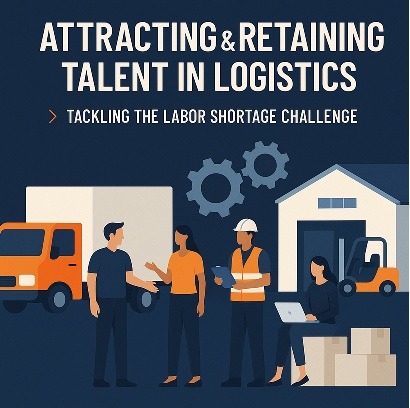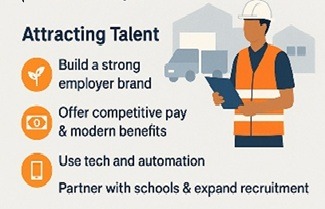
Labor Shortage: Attract and Retain Talent in Distribution & Logistics
In an era where global supply chains are more critical than ever, the logistics industry is grappling with a profound challenge: a significant labor shortage. As of 2025, the U.S. logistics sector is projected to face a shortfall of over 2 million workers, and it is causing shipping delays, product shortages, and skyrocketing costs for goods and services. One in four freight firms identifies the labor shortage as their top concern this year. In this article, I will explore the root causes of the shortage and actionable ways to build a resilient workforce.
Understanding the Labor Shortage: Root Causes
The logistics and warehouse labor crisis didn’t emerge overnight. Several intertwined factors are at play:
Aging Workforce: A significant portion of the industry’s employees, particularly truck drivers, are nearing retirement. The truck driver shortage alone is expected to double by 2028, exacerbating the problem. Globally, unfilled vacancies in trucking could follow suit without intervention.
Underrepresentation and Demographics: Women and younger workers are underrepresented in logistics roles. For instance, the sector struggles to attract diverse talent pools, thereby limiting the influx of new talent.
High Impact Across Operations: Approximately 67% of transportation operations and 56% of warehouse operations are directly impacted by these shortages, resulting in operational bottlenecks. The rise in e-commerce has only amplified demand, creating a skills gap that’s hard to bridge.
Broader Economic Pressures: Outdated systems, traditional processes, and a general U.S. labor shortage rate of 70% compound the issue, making logistics less attractive compared to other industries.
These causes underscore why simply hiring more people is insufficient; logistics companies must reassess their approach to talent management.
Strategies to Attract Talent

Strengthen Employer Branding: Young professionals increasingly view jobs as more than a paycheck. They want to work for organizations that align with their values. Companies that highlight their impact on communities, investments in sustainability, and growth opportunities are more likely to stand out.
Offer Competitive Pay and Benefits: While logistics roles have traditionally competed on wages, today’s employees also value flexible benefits, including healthcare packages, retirement planning, and even perks such as wellness programs or tuition reimbursement.
Leverage Technology to Appeal to Younger Workers: Digitally native talent expects modern tools in the workplace. Using warehouse management systems (WMS), automation, and mobile apps for operations not only improves efficiency but also signals to candidates that the company is forward-thinking.
Expand Recruitment Channels: Partnerships with trade schools, universities, and workforce development programs can build pipelines of skilled workers. Additionally, tapping into underrepresented groups, such as women, veterans, or people re-entering the workforce, can open new talent pools.
Strategies to Retain Talent
Focus on Training and Development: Continuous learning is a key tool for employee retention. Programs for upskilling in areas like automation, data analysis, or leadership create clear career paths and keep employees engaged.
Enhance Workplace Culture: A positive environment founded on safety, respect, and inclusion is essential. Recognition programs, mentorship, and clear communication channels go a long way in creating loyalty.
Create Opportunities for Advancement: Retention improves when employees see a clear path for advancement within the company. Clear progression ladders, from entry-level roles to supervisory and managerial positions, can turn short-term jobs into long-term careers..
Conclusion on Labor Shortage in Logistics
The logistics labor shortage isn’t going away overnight, but companies can turn the tide by adopting a proactive approach. Attracting talent requires showing the industry’s importance, modernizing the workplace, and offering compelling reasons to join. Retaining talent means investing in people, not just processes, and ensuring employees feel valued and see growth opportunities.
Those logistics companies that make talent strategy a top priority will not only weather the current shortage but also position themselves as leaders in an industry that is constantly evolving. Laceup warehouse management solutions can help you cope with the challenges associated with it. Contact us to learn more about our solutions.
I hope this article about labor shortage, have been helpful. I will continue to post information related to management, distribution practices and trends, and the economy in general. Our channel has a lot of relevant information. Check out this video on how a WMS Helps Train New Employees.


Sorry, the comment form is closed at this time.